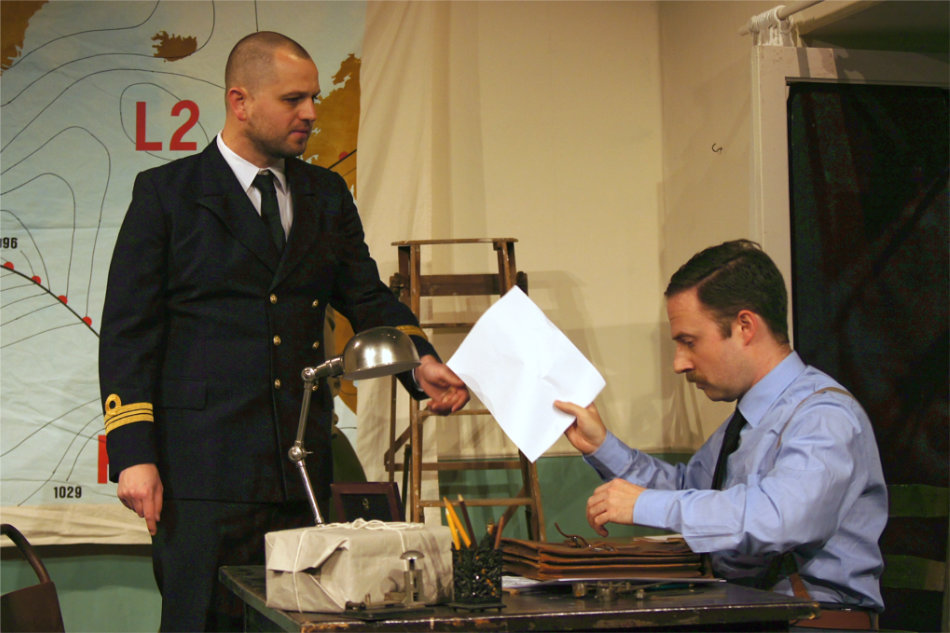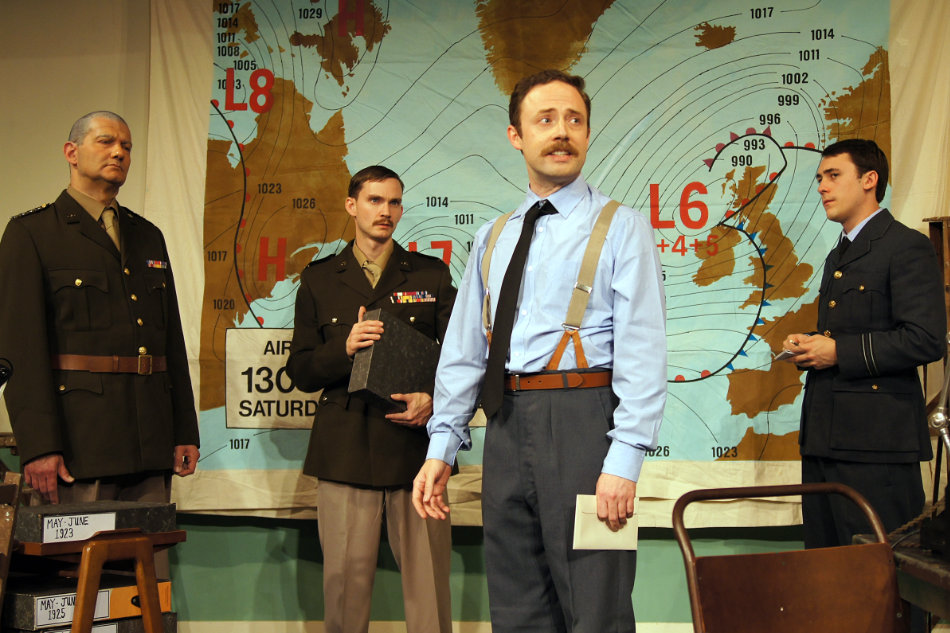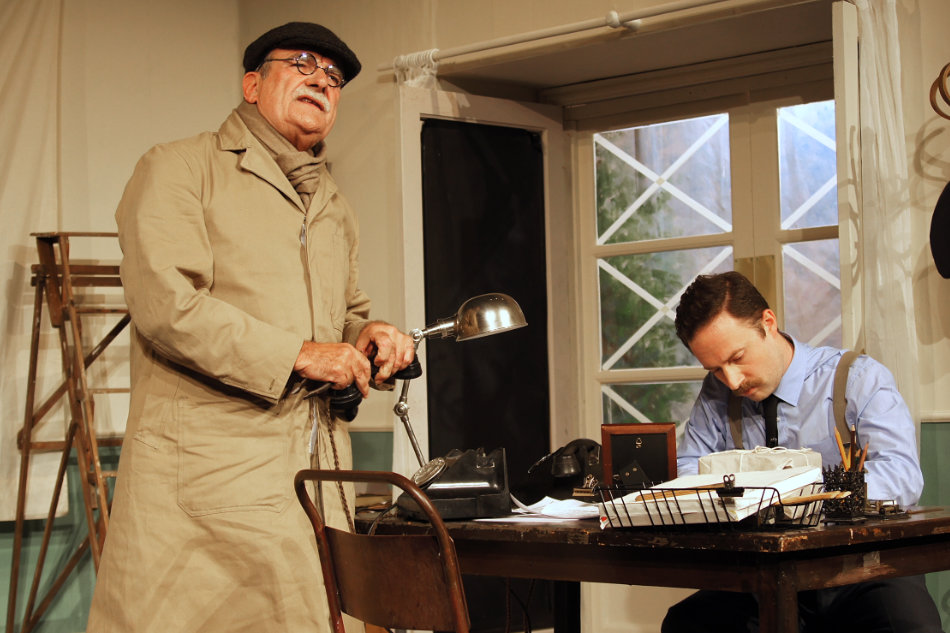General
I was really glad to be asked to cover this show, and to have the
opportunity to see another LADS play after so enjoying ‘The Lion in
Winter’ before – you put together such interesting productions, and the
welcome is always so warm. This play in particular was well-rounded and
very well-acted, well done to all involved.
Players-Leading
As ‘Dr James Stagg’, Dean Bartholomew achieved a real stand-out
performance with a very believable character enhanced by moments of
superb emotional depth. From the start Dean gave us a thorough and
always interesting portrayal, capturing the brisk, urgent mood of
‘Stagg’ very effectively with really good pace of dialogue. His
brusqueness was often very funny, which contrasted well with his anxiety
for his pregnant wife – his panic attack, with shaking hands sloshing
tea from its cup, was poignantly believable. What really impressed me,
though, was the rapport that he built with the audience – when ‘Stagg’
took a phone call with news of his wife and tearfully said ‘thank you
for letting me know’, a genuine ripple of concerned sympathy could be
heard running through the audience, and when he later revealed that it
had been good news and he had a son, one man cheered. The audience was
evidently utterly absorbed in ‘Stagg’s’ story, something that I haven’t
seen before in any play that I’ve been to for NODA – congratulations.
Fiona Delves’ ‘Lt Kay Summersby’ was a lively and engaging character. I
really enjoyed her ‘capable head girl’ persona, and the opening scene
where she strove to hide her evident exasperation with ‘Stagg’ behind a
bright smile was very funny. Her relationships with other characters
were very human and believable – the physical cringe in her interactions
with ‘Krick’ told us everything we needed to know about his character,
while her blossoming friendship with ‘Stagg’ was a very enjoyable
journey. The key relationship was, of course, with ‘Eisenhower’, and was
depicted with real sensitivity and feeling – Fiona has such an
expressive face, and this really came to the fore in the beautifully
tender look that she gave the general when he fell asleep after talking
about American Football towards the end of the play. Fiona also has
excellent comic timing – I particularly enjoyed her tipsy acting, which
was very convincing and funny!
As ‘General Eisenhower’, Howard Platt portrayed a complex and
impressively varied character, demonstrating his great dramatic range by
swinging from jovial optimism to ferocious temper, with some very sweet
moments with ‘Summersby’ in between. The loving look that he gave her
from the doorway when she was cooling herself at the window was utterly
believable – this pair had great stage chemistry. He had a good
consistent accent and also did a pretty impressive Winston Churchill
impression – an entertaining and thoroughly interesting
characterisation.
Support
The play found a worthy antagonist in Phillip Watson’s ‘Col Irving Krick’
– he showed really interesting character development over the course of
the play, as ‘Krick’ initially came across as merely exasperatingly
ebullient and over-exuberant (providing a striking contrast with his
more buttoned-up British colleagues), before emerging as a much more
confrontational figure. Very effective.
Freddie Parker represented a genial and engaging figure as ‘Andrew’, but
I’d particularly like to commend him for his quick reaction when the hat
stand fell over in the first scene – Freddie didn’t drop character, but
smoothly picked the stand back up, saying ‘Let me get that, Sir’, before
continuing with the scene – a flawless cover, and professionally done!
Nice work.
I would also particularly like to commend Graham Milne for his amazingly
contrasting performance as the ‘Electrician’ and ‘General Spaatz’ - he
managed to create two such different characters that I had to check the
programme to see who was playing the general, as I didn’t recognise him.
The jovial, if weary and homesick, electrician was a very likeable
salt-of-the-earth type; the transformation into ‘Spaatz’ was
impressively comprehensive, whether in his accent, his demeanour, or
even in the way that Graham held himself, it was like watching two
different men. Really very well done indeed.
Together with ‘General Spaatz’, ‘Sir Trafford Leigh Mallory’ (a
dignified and statesmanlike Martin Howarth), ‘Admiral Ramsay’ (an
authoritative performance by Richard Cohen), and ‘Commander Franklin’
(Michael Lewcowicz, a believable leader of men) formed a very effective
quartet of martial leaders – each was very much his own character, and
each had an impressively military bearing in the way he held himself –
they were very convincing officers.
As the ‘Naval Meteorologist’, Nick Charles was a calm presence on the
stage. He was particularly good at ‘background bustle’, though, always
active and always creating something interesting to see. This didn’t
detract from the main action, but helped imbue the set with the sense of
it being a real working place.
Adam Rabinowitz gave an earnest performance as ‘Lt Battersby’,
contrasting well with his other appearance as ‘Captain Johns’. Well done
for creating two distinct characters, and for an entertaining
performance.
Director
I hope Christian Mortimer is proud of this emotionally rich production –
all of the characters were really well devised and well rounded (it
seems odd to say ‘they seemed really real’ when the play is a true
story, but this is testament to the great performances given by the
cast), and the relationships between them felt very believable. Good use
of the available space – the ‘office’ very much felt like a real place –
but I was most impressed by the pace and energy of the dialogue, which
flowed beautifully. Well done!
Stage Management
I don’t have much to say about stage management, which is always a big
complement to how smoothly everything went! Well done to SM Jean Cooper,
ASM Emily Cooke, and Backstage Assistant Judith Thompson for keeping
things rolling so effectively and efficiently – there was nothing to
distract or pull the viewer out of the story.
Sound and Lighting
Lighting was designed by Terry Tew, and sound by Cathy Naylor; they were
operated by Sarah Biggs and Val Jones. The lighting was used efficiently
to create a sense of a real indoor space (I realise I have mentioned
realism in quite a few sections, but the feeling of looking through a
window onto an actual situation was very impressive); there were no
superfluous effects or anything to break the spell of authenticity.
Sound was also used to great effect, such as the distant noise of the
crashing aircraft, and well-timed ringing of the telephones.
Set Design
Designed and constructed by Stephen Radley, the set was really
immersive, creating a believable sense of a real workplace. It was
impressive how a few well-chosen pieces of furniture really captured the
historical period, and I was particularly taken by the big weather maps,
which were the perfect finishing touch and looked fantastic. I was
talking to the chap behind the bar during the interval who said they had
been specially made for the production – the effort was certainly worth
it, they were great!
Props
An excellent assemblage of period-appropriate props had been put
together by Val Jones and Vee Wells, including some impressively
specialised meteorological equipment that must have been tricky to
source or make. This really enhanced the historical feel of the
production – nicely done.
Costumes
Well done to Liz Adams for putting together a historically appropriate
and very consistent wardrobe for the cast. The uniforms were very sharp
(though was ‘Krick’s’ slightly too big for him?), enhancing the
characters’ military bearing, and very much adding to the period feel of
the play.
Programme
Designed by Howard Platt, this was an attractive and very interesting
programme. LADS programmes are always so informative (I enjoyed the
handy historical context and dynastic family trees given for the ‘Lion
in Winter’ too), and in this case the historical background information
and the text about weather forecasting was great to read. Best of all
though was the inclusion of photos of the real people who were being
portrayed – it really brought home that this was a true story and was a
very neat touch.
Front of house
Thank you very much for such a warm and friendly welcome – your FoH team
were so kind. I’d also like to mention the barman (I wish I’d noted down
his name!) who I spoke to in the interval – after clocking my badge, he
had all sorts of interesting insights into the production to share, not
least the creation of those wonderful weather charts. Always a joy to
come to a LADS show – I hope to see you again!




